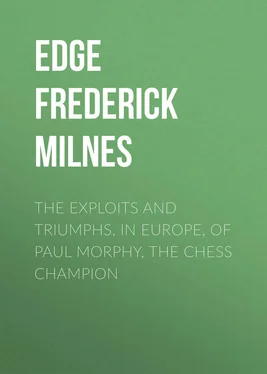Frederick Edge - The Exploits and Triumphs, in Europe, of Paul Morphy, the Chess Champion
Здесь есть возможность читать онлайн «Frederick Edge - The Exploits and Triumphs, in Europe, of Paul Morphy, the Chess Champion» — ознакомительный отрывок электронной книги совершенно бесплатно, а после прочтения отрывка купить полную версию. В некоторых случаях можно слушать аудио, скачать через торрент в формате fb2 и присутствует краткое содержание. Жанр: Развлечения, foreign_antique, foreign_prose, на английском языке. Описание произведения, (предисловие) а так же отзывы посетителей доступны на портале библиотеки ЛибКат.
- Название:The Exploits and Triumphs, in Europe, of Paul Morphy, the Chess Champion
- Автор:
- Жанр:
- Год:неизвестен
- ISBN:нет данных
- Рейтинг книги:4 / 5. Голосов: 1
-
Избранное:Добавить в избранное
- Отзывы:
-
Ваша оценка:
- 80
- 1
- 2
- 3
- 4
- 5
The Exploits and Triumphs, in Europe, of Paul Morphy, the Chess Champion: краткое содержание, описание и аннотация
Предлагаем к чтению аннотацию, описание, краткое содержание или предисловие (зависит от того, что написал сам автор книги «The Exploits and Triumphs, in Europe, of Paul Morphy, the Chess Champion»). Если вы не нашли необходимую информацию о книге — напишите в комментариях, мы постараемся отыскать её.
The Exploits and Triumphs, in Europe, of Paul Morphy, the Chess Champion — читать онлайн ознакомительный отрывок
Ниже представлен текст книги, разбитый по страницам. Система сохранения места последней прочитанной страницы, позволяет с удобством читать онлайн бесплатно книгу «The Exploits and Triumphs, in Europe, of Paul Morphy, the Chess Champion», без необходимости каждый раз заново искать на чём Вы остановились. Поставьте закладку, и сможете в любой момент перейти на страницу, на которой закончили чтение.
Интервал:
Закладка:
In 1842 Mr. Ries invited Labourdonnais to come over from Paris, and play exclusively at the Divan, which offer that great master accepted. But his constitution was already shattered, and the malady which eventually carried him off interfered with his devoting much time to chess, and no matches of importance were played by him during the period. It was next door to the Divan, at No. 6 Beaufort Buildings, in rooms taken for him by Mr. Ries, that Labourdonnais finally succumbed to that terrible antagonist who, whatever the opening may be, brings the game of life to one inevitable ending – death!
Who, known to fame in chess during the past quarter of a century, has not assisted in making the Divan classic ground? Of bygone palladins we might instance Popard, Fraser, Zenn, Daniels, Alexander, Williams, Perigal, and a host of others, never for a moment forgetting Labourdonnais and Kieseritzky. The veterans Lewis and Walker made it a place of constant resort before they withdrew from the chess arena. In the Divan, Staunton rose from a Knight-player to a first rate. St. Arnaud, Anderssen, Harrwitz, Hörwitz, Kling, – in fact all the great living celebrities – make it their house of call when in London, whilst the brilliant corps d'élite composing the phalanx of English players – Löwenthal, Boden, Barnes, Bird, Lowe, Falkbeer, Wormald, Campbell, Zytogorsky, Brien, &c., &c., may frequently be found there, ready to meet all antagonists. When Mr. Buckle casts a "longing, lingering look behind" at his first love, he offers homage to Caïssa at the Divan. But we must stop, or we shall fain run through the whole list of living players.
In the room are busts of Lewis, Philidor, Labourdonnais, and other vieux de la vielle , and the library is replete with all the chief works on chess. From noon to midnight, players of every shade of strength are to be met with; – amateurs who learned the moves last week; professors who analyze openings, adepts inventing new defences, and editors who prove satisfactorily that the winner ought to have lost and the vanquished to have gained. [ Salām to the Divan! May it live a thousand years!]
The Divan has certainly done much to spread a liking for the game amongst the masses; but, at the same time, it has somewhat interfered with the formation of a flourishing West End Chess Club. There is no city in the world in which so much chess is played as London, and the British metropolis should certainly show, at least, one club numbering from 500 to 1,000 members. Club life is an institution peculiar to Englishmen; divans, even when so well managed as Ries's, partake rather of the Gallic element, being of the genus café. Your aristocratic Briton frequents not the public saloon, preferring the otium cum dignitate of the private club. I am aware that chess in England is not fostered by the upper ranks of society: its amateurs are to be found mainly in the middle classes. Shopmen, clerks, professors of the arts, literary men, &c., form its rank and file. The majority of these, I speak of them as Englishmen, object to a place of public resort from various reasons. Smoking displeases some, and smoking is part and parcel of a divan. The Automaton itself could not get on without its tchibouk . All the advantages and none of the drawbacks of a public hall, are to be obtained at a club; especially when, as at the St. George's, one room is set apart for smoking. Surely the late impulse given to chess by Paul Morphy's European feats, will increase the members of these chess associations, which are incontestably the best schools for progress in the game.
About the year 1824, three or four young gentlemen who had recently learned chess, or rather the mechanical part of it, and had been playing a good deal together, made vain inquiries as to the existence of a Chess Club at the West End of London, being desirous of showing off their abilities to new advantage. The foremost of these ambitious juveniles was Mr. George Walker, the eminent Chess writer, and an author, too, whose never failing bonhommie is worthy of Lafontaine. Finding that "westward the star of empire" and of chess had not, as yet, begun to "take its way," they resolved to have a Club of their own. Philidor's Club could not be said to exist; the flame was flickering in some obscure corner, and the last member was preparing to leave. But the sacred fire was not to die out: – George Walker and his fellow youngsters built an altar for it at the Percy Coffee-House in Rathbone Place, Oxford Street, and blew the flame into a perfect blaze. Percy's Coffee-House was then a first-rate hotel: Belgravia, Brompton, Pimlico, were corn-fields and market-gardens, and the aristocracy had not emigrated from the neighborhood of Oxford Street. The denizens of that ilk might be supposed to find some leisure for the enjoyment of such a pastime as chess, and Walker and Co. soon enlisted upwards of a score of recruits. Night after night the members played what they in their innocence called chess, finishing the Monday evening with a supper, after which harmony and "the flowing bowl" prevailed. Things went on swimmingly in this Mutual Admiration Society, until one of the members, Mr. Perrier, of the War Office, upset the status quo by bringing into their midst Mr. Murphy, the celebrated ivory miniature painter, and father of Mrs. Jamieson, the authoress. Dire was the result; Mr. Murphy proved a very Trojan horse in this West End Ilium: for, as Mr. Walker says, "he entirely dispelled the illusion of the 'bold Percies' that they had been playing chess." He gave them one and all a Knight, essayed the Gambit on every occasion, and not one of the young gentlemen could make a stand against him.
As though not sufficiently humiliated, Mr. Murphy introduced Mr. Lewis to them, and the new comer completed their bewilderment by giving them the Rook and sweeping them clean off the board. But with such a master, the Percies, by dint of diligent study and practice, rapidly improved, and it was suggested to Mr. Lewis that he should open a private club at his own house. After a short delay this was accomplished, and nearly all the members joined Mr. Lewis, when he opened subscription rooms in St. Martin's Lane – classic ground surely, for a former Chess Club had lived and died at Slaughter's Coffee-House, hard by.
Mr. Lewis collected quite a number of players around him, and was in fair way to find his enterprise profitable; but the most prominent members demurred to his not playing with them so much as they desired, more especially as Mr. Lewis did not appear to regard the institution as a Free School for the inculcation of Chess. The best of the young amateurs were Messrs. Walker, Brand, Mercier and McDonnell; the last, the best of the lot. McDonnell received from Mr. Lewis the odds of Pawn and Two Moves, but when he had fairly surmounted that advantage and could win every game, his antagonist declined playing on even terms, much to McDonnell's disappointment. This, however, appears to be the usual course with leading chess players, – Deschappelle's conduct in regard to Labourdonnais being a notable example of the fact. There are peculiar idiosyncrasies in chess human nature, as, for instance, the remarkable reserve and " don't-come-nigh-me " feeling with which leading amateurs treat each other. Go into any public or private chess association, and you will find that the superior craft steer clear of each other as a general thing; reserving their antagonism for matches few and far between.
The Club subsequently removed to the bottom of St. Martin's Lane, and shortly broke up, McDonnell and others returning to the London Club, whence they had migrated. A futile attempt was afterwards made to establish a grand aristocratic silk and satin club in Waterloo Place, the door of admission to which could only be opened with a golden key of ten guineas. Here lots of every thing could be found except chess, and no wonder, for the game does not find supporters, to any extent, among the rich, depending mainly upon individuals to whom ten guineas are a consideration. The club expired in twelve months. Caïssa thus lost her last foothold at the West End, and Mr. Lewis henceforth virtually abandoned the practice of chess.
Читать дальшеИнтервал:
Закладка:
Похожие книги на «The Exploits and Triumphs, in Europe, of Paul Morphy, the Chess Champion»
Представляем Вашему вниманию похожие книги на «The Exploits and Triumphs, in Europe, of Paul Morphy, the Chess Champion» списком для выбора. Мы отобрали схожую по названию и смыслу литературу в надежде предоставить читателям больше вариантов отыскать новые, интересные, ещё непрочитанные произведения.
Обсуждение, отзывы о книге «The Exploits and Triumphs, in Europe, of Paul Morphy, the Chess Champion» и просто собственные мнения читателей. Оставьте ваши комментарии, напишите, что Вы думаете о произведении, его смысле или главных героях. Укажите что конкретно понравилось, а что нет, и почему Вы так считаете.












